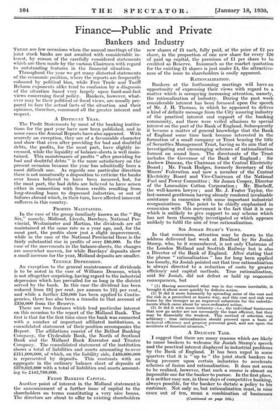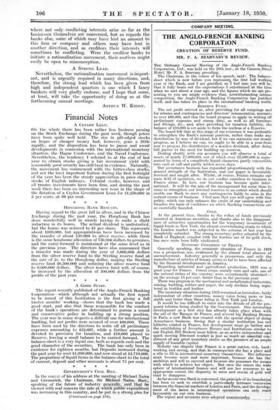Finance—Public and Private
Bankers and Industry
THERE are few occasions when the annual meetings of the joint stock banks are not awaited with considerable in- terest, by reason of the carefully considered statements which are then made by the various Chairmen with regard to outstanding features in the financial situation.
Throughout the year we get many distorted statements of the economic position, where the reports are frequently coloured by political bias, while Free Trade and • Tariff Reform exponents alike tend to confusion by a diagnosis of the situation based very largely upon hard-and-fast views concerning fiscal policy. Bankers, however, what- ever may be their political or fiscal views, are usually pre- pared to face the actual facts of the situation and their opinions, therefore, command all the greater interest and respect.
A DIFFICULT YEAR.
The Profit Statements by most of the banking institu- tions for the past year have now been published, and in some cases the Annual Reports have also appeared. With scarcely an exception, they are of a favourable character and show that even after providing for bad and doubtful debts, the profits, for the most part, have slightly in- creased, while the liquidity of balance-sheets is well main- tained. This maintenance of profits " after providing for bad and doubtful debts " is the more satisfactory on the present occasion because the year has admittedly been a most difficult one. As regards one particular direction there is not unnaturally a disposition to criticize the banks over losses believed to have been incurred, but, for the most part, the bad debts are believed to have arisen either in connection with frozen credits resulting from long-standing loans to depressed industries, or out of failures abroad which, in their turn, have affected innocent sufferers in this country.
PROFITS MAINTAINED.
In the case of the group familiarly known as the " Big Six," namely, Midland, Lloyds, Barclays, National Pro- vincial, Westminster and Martins, the dividends are all maintained at the same rate as a year ago, and, for the most part, the profits show just a slight improvement, while in the case of the National Provincial there is the fairly substantial rise in profits of over £80,000. In the case of the movements in the balance-sheets, the changes are somewhat uneven, for while Barclays' deposits show a small increase for the year, Midland deposits are smaller.
TEXTILE DEPRESSION.
An exception to the general maintenance of dividends is to be noted in the case of Williams Deacons, which is not altogether surprising, having regard to the industrial depression which has prevailed for so long in the district served by the bank. In this case the dividend has been reduced from 13/ per cent. per annum to 121 per cent., and while a further £50,000 has been applied to Contin- gencies, there has also been a transfer to that account of 1350,000 from the Reserve.
There are two features which lend particular interest on this occasion to the report of the Midland Bank. The first is that for the first time since the bank was connected with a number of important affiliated institutions, a consolidated statement of their position accompanies the Report. The affiliations consist of the Belfast Banking Company, the Clydesdale Bank, the North of Scotland Bank and the Midland Bank Executor and Trustee Company. The consolidated statement of the institution shows a total of liabilities and assets amounting to over £511,000,000, of which, on the liability side, £489,000,000 is represented by deposits. This contrasts with an aggregate in the ordinary balance sheet of deposits of £379,623,000 with a total of liabilities and assets amount- ing to £445,789,000.
FRESH BANKING CAPITAL.
Another point of interest in the Midland statement is the announcement of a futther issue of capital to the shareholders on terms constituting a very nice bonus. The directors are about to offer to existing shareholders new shares of £1 each; fully paid, at-the price of £2 per share, in the proportion of one new share for every £20 of paid up capital, the premium of £1 per share to be credited as Reserve. Inasmuch as the market quotation for the existing £1 shares is just under £4, the attractive- ness of the issue to shareholders is easily apparent.
RATIONALIZATION.
Bankers at the forthcoming meetings will have an opportunity of expressing their views with regard to a matter which is occupying increasing attention, namely, the rationalization of industry. During the past week considerable interest has been focussed upon the speech of Mr. J. H. Thomas, in which he appeared to deliver a kind of definite message from the City assuring industry of the practical interest and support of the banking community, and there were veiled allusions to special interest on the part of the Bank of England. Subsequently it became a matter of general knowledge that the Bank of England some time back became interested in the formation of a small company or Trust bearing the title of Securities Management Trust, having as its aim that of investigating and encouraging schemes of rationalization formed on sound lines. The directorate of the Trust includes the Governor of the Bank of England ; Sir Andrew Duncan, the Chairman of the Central Electricity Board ; Mr. Frank Hodges, formerly Secretary of the Miners' Federation and now a member of the Central Electricity Board and Vice-Chairman of the National Fuel and Power Committee ; Sir James Cooper, Director of the Lancashire Cotton Corporation ; Mr. Bischoff, the well-known lawyer ; and Mr. J. Frater Taylor, the last-named gentleman having already rendered invaluable assistance in connexion with some important industrial reorganizations. The point to be chiefly emphasized in connexion with this movement is the fact that it is one which is unlikely to give support to any scheme which has not been thoroughly investigated or which appears unlikely to fulfil the aim of true rationalization.
SIR JOSIAH STAMP'S VIEWS.
In that connexion, attention may be drawn to the address delivered last week at Bradford by Sir Josiah Stamp, who, be it remembered, is not only Chairman of the London Midland and Scottish Railway but is also a Director of the Bank of England. After stating that the phrase " rationalization ' has for long been applied too loosely, Sir Josiah pointed out that true rationalization is always directed to a reduction of costs by greater efficiency and capital methods. True rationalization, said Sir Josiah, did not defeat or hold up economic consequences, but " (1) Having ascertained what was in due course inevitable, it brought it about more quickly by definite action.
(2) It did it more humanely by spreading some of the cost and the risk in a prescribed or known way, and this cost and risk was borne by the stronger as an improved substitute for the enfeeble- ments which came about by unto-ordinated action. (3) It did It with more certainty—i.e., the individual businesses that now go under are not necessarily the least efficient, but they may be financially the weakest. This method of selection was arbitrary : true rationalization should proceed upon a basis of technical efficiency and greatest potential good, and not upon the accidents of financial situation."
A DELICATE TASK.
I suggest that there are many reasons which are likely to cause bankers to welcome Sir Josiah Stamp's speech and the practical interest displayed in industrial problems by the Bank of England. It has been urged in some quarters that it is up to " the joint stock bankers to bring pressure upon certain industries to accelerate schemes of fusion and rationalization. It does not seem to be realized, however, that such a course is almost an impossible one for the banker to pursue. In the first place, it is neither easy nor, in these days of competitive banking, always possible, for the banker to dictate a policy to his customer. Not only so, but rationalization must, in nine cases out of ten, mean a combination of businesses (Continued on page 106.) where not only. conflicting interests arise so -far as the businesses themselves are concerned, but as regards the banks' also, some of which may have lent an amount to this firm or company and others may have lent in another direction, and- as creditors their interests will sometimes be conflicting. Were the creditor banks to initiate a rationalization movement, their motives might easily be open to misconception.
A STRONG LEAD.
- -
Nevertheless, the rationalization 'movement is impOrt- ant, and is urgently required in many directions, and, therefore, the strong lead which has been given from high and independent quarters is one which I fancy bankers will very gladly endorse, and I hope that some, at least, will take the opportunity of doing so at the forthcoming annual meetings.
ARTHUR W. KIDDY.







































 Previous page
Previous page